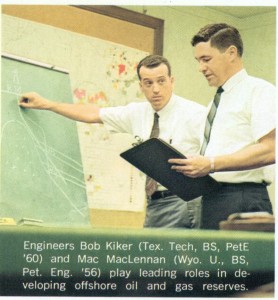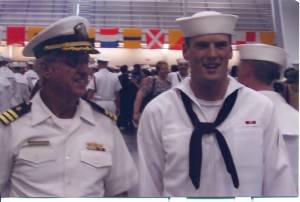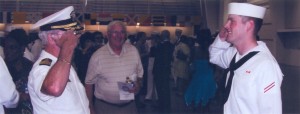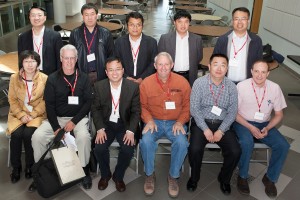With Memorial Day approaching, we share coverage of a distinguished U.S. military veteran who came home to deployment, so to speak, in the Permian Basin oilfield. After a long, successful career and countless contributions to his field, industry gem Bob Kiker says he feels accomplished and at peace.
By Shanti Terry, PBOG contributor
I must admit, when I first laid eyes on Bob Kiker, I was taken back. His appearance completely shattered the image I’d had in my mind. I pictured a weathered individual, someone who’d worked himself hard for years and was coming to tell me about the weary road he’d traveled to success. (After all, in my pre-interview research I found that he’d been working in the industry for something more than 50 years.) I imagined he’d be the sort of individual to start our conversation with a sentence like: “Back in my day…” Much to my surprise, as I interacted with him, I saw and heard nothing but vibrancy.
Bob sat cheerfully across from me, smiling. His eyes were kind and they had a definite spark. There weren’t tired but full of life. There was even perhaps a bit of mischief in them. He looked relaxed, wearing a soft polo and comfy pants. Although relaxed, he looked polished, sporting a neck chain, bracelet, and his wedding band. All three were gold, but not garish. As he stood to shake my hand and introduce himself, I could see that he was eager to get things under way.
To break the ice, he’d brought a book he said he thought I’d enjoy for some light reading. He stood up and dropped it from some distance onto my desk. I picked it up and realized that it was a CO2 flooding textbook written in Mandarin. As Bob stood laughing, I could tell right away that I was in for a very interesting visit.
To begin, I suppose I should start by telling you why it is that Bob Kiker should be of some interest to you. He’s a prime example of where we’d all hope to wind up at the end of our careers. He has a family that he loves and is proud of. He’s served his country as a Naval Commander. He’s spent his career doing work he loves in the oil and gas industry as an engineer. He’s worked diligently, with a loving devotion to his field, gathering up as much knowledge possible. After all that, he spent many years giving everything he’s learned back to others as a teacher. Now, retired at age 77, Bob Kiker looks back on his journey so far and feels accomplished and at peace. His life has not been perfect, but it’s been well lived and he worked hard to make sure of that.
All About Bob
Raised in Colorado City, Texas, Bob Kiker attributes his initial interest in the oil and gas industry to his experiencing the effects of an oil boom in Snyder, which was just north of his hometown. He says things were really booming in West Texas during that time. According to Kiker, the bulk of the boom was from 1948 to 1951. The economy in Snyder and surrounding areas flourished during the next few years as the success trickled down.
Growing up, individuals all around Kiker had involvement in the oil and gas industry. His parents rented a room to individuals involved in seismic work, and friends’ parents worked in the industry too. When he was in high school, he took a job as a night watchman on a rig, keeping an eye on things while the workers were away. It was a turning point for him. Bob said, “I just got interested in the industry after that. It looked like a very successful career path to take. I started by getting my degree in Petroleum Engineering at Texas Tech in 1960.”
It was during his time at Tech, Bob met Jean, his first wife. Jean stayed by his side throughout his life venture of joining the military and diligently developing his oil and gas career until 2004, when she passed away. The couple had two children, a daughter named Kimberly and a son, Robert Kiker II.
With his family under way and his degree completed, Kiker was set on the path to success. Although he would later join up with Conoco, which would lead to his involvement with the PBPA, PTTC, APTA, and other organizations, Kiker’s first stop after college was joining the U.S. Navy. He’d taken a deferment to attend college, and once he was done, he was off to serve his country.
McHale’s Navy
Although Kiker’s initial involvement with the U.S. military may have been born out of a government enforced military obligation, his love for the time he spent serving his country was born of his own free will. Even after serving his term in the Pacific, Kiker continued his journey with the military. “I remember that initially, I was helping to load out the marines when we were going to invade Cuba, back during the missile crisis. I’ve never seen such high morale in the military as there was at that time. After my four years on active duty, I joined the Navy Reserve. I was with Conoco at the time, so every time they moved me, I’d hop to it and go find the local Navy reserve.”
From the start of Kiker’s military journey, when he signed on and went to officer’s school in Newport, Rhode Island, to his retirement as a naval commander, he worked hard to fulfill his duties and enjoyed himself while he was at it. I asked him about his favorite memories, and found that he had one particularly fond memory of an assignment that he was happy to share:
“We had one assignment that was super. One year, we got an assignment to work with the U.S. Air Force on my ship. We were logistics support putting in all the satellite navigation stations in the Pacific on the islands. We were operating independently, so we didn’t have a big boss looking over us. We had Air Force helicopters aboard and we were their supply support. We’d sail and they’d fly onto to the islands to install the satellite navigation stations. The planes would fly over to beam in and get everything all set up, and then we’d move to the next island. We set up all of the satellite navigation stations that are still used today. We would go swimming in the bays of some of them, but we always had a lookout. A couple sailors would have M-1’s in case sharks showed up. To me, it was like being on that show, McHale’s Navy. We wore shorts and t-shirts, and we didn’t worry about all the formalities for the time. We went into Midway Island after we’d been out at sea for 96 days, and they had an officer’s club there. I’ll never forget it. We went to that club and enjoyed that ten-cent beer. We had three days to spend there to become humans again, and then it was back out to sea.”
Aside from all the assignments and adventures, Kiker told me that he also enjoyed the camaraderie that he experienced in the Navy. He made great friends that are still a part of his life today.
On to Conoco
As mentioned earlier, Kiker’s devotion to the U.S. Navy lasted throughout his 30-year career with Conoco, which began in 1964 after he finished his tour with the Navy. Kiker’s career at Conoco is really what laid the groundwork for what would later become his legacy: transferring knowledge and technologies to students and industry professionals.
Kiker looks back on his time with Conoco fondly, as he was blessed to receive a wide variety of different experiences. He started in Odessa and then wound up in Midland when everything was all said and done. That may not sound like he traveled very far, but due to the amount transfers Kiker had while working for Conoco, he made many stops before coming back to the Permian Basin. Bob describes each move as well worth the trip, since each transfer always came with a promotion and a chance for a new adventure. From engineer-in-training to senior engineer to production superintendent, Kiker spent time in Texas, Louisiana, and even Wyoming.
When asked to describe his experiences, Kiker said. “In my career, I’ve been in drilling off-shore operations and in various conditions including whiteouts, hurricanes and all kinds of stuff. I remember when I was off-shore in New Orleans, and when I was freezing in North Dakota sometimes I’d wonder, ‘What am I doing out here?’ Still, they were great experiences.”
Each of Kiker’s experiences came with volumes of new knowledge to be gained—knowledge that would one day be passed on to others here and around the world. One such educational experience Kiker recalls learning a lot from was an experiment concerning shallow reservoirs in Casper, Wyo.
“I got a terrific assignment while I was there,” said Bob. “Conoco had a new vice president that was a great guy. There were some shallow reservoirs up there north of Casper off the Big Horn Mountains that were only about 300 feet deep. They were natural drainage, and those are rare. He had an idea from a procedure that had been done in Russia a few years back. He wanted to drill a mine shaft down into the reservoir, then drill an oil well, intercept the shaft and hollow things out so we’d have a big room down there. Next, he wanted to drill horizontal wells out from there and let it all seep down and fill up. Last, we’d attach a pumping unit up top. We did it, and it worked very well. At the time, it was an engineering success, but an economic failure. He didn’t care. He just wanted to show that it could be done so we could learn from it and go into the future with more knowledge. We finished out that well at 77 barrels of oil a day, so in today’s world, it would have been an economic success.”
After Wyoming, with a full career’s worth of knowledge and experience under his belt, Kiker returned to the Permian Basin to work in Midland. Though he didn’t know it yet, he was coming to begin involvement with entities that would further him in his journey towards leaving his legacy. To get the full scope of things, I spoke with individuals who’ve worked with him here at various organizations in the Permian Basin. Each of them had much to say about their experiences with Bob.
Kiker and the PBPA
For four years after retiring from Conoco, Bob Kiker worked for the PBPA, a stint that lasted until 1998. His title was the executive vice president, which was similar to the position that is now called the president. With an extensive list of responsibilities, Kiker says the position kept him busy. “I was required to follow regulatory issues very closely. Whether they’re of federal or state origin, regulatory issues affect the PBPA membership and the oil and gas industry as a whole. I was a lobbyist for the association on both federal and state platforms. In addition to that, I organized events, such as the the PBPA Annual Meeting, the Top Hand Award Banquet, and the golf tournament. I also held committee meetings to evaluate and prepare to testify at hearings.”
Buddy Sipes (Owner of Chisos Operating) and Paul Morris (Chief Executive Officer at Elk River Resources, LLC) were two members of the board for the PBPA during the time Kiker was the Director. Both said they remember Kiker being a great part of the PBPA team:
“Bob had a good work ethic and was always one to come up with fresh ideas,” says Sipes. “One phrase I remember him saying often was, ‘Well, let’s try this.’ He was not opposed to trying new things.”
Morris shared, “Bob came to the PBPA at a very difficult time in the oil business. He was always intense and very dedicated to his work. He replaced a long time legend, Harry Spanas. I’m sure it was hard to fill his shoes, but Bob did a great job.”
Kiker and the PTTC
After his time with the PBPA, Kiker moved on to the PTTC (Petroleum Technology Transfer Council). In 1999, he was chosen to serve as the Permian Basin Program Director. One of his core responsibilities was the organization of workshops in the Permian Basin. According to Sigrid Clift, who was a new manager of the PTTC Texas Region during the time Kiker was there, Bob always had a willingness to tackle a job and get it done. Sigrid worked on the council with Bob for ten years, and she describes him as a kind friend who possesses a wealth of knowledge:
“Bob served as my mentor and shared his engineering knowledge with me. He introduced me to technologies that I had only heard about. I am thankful for the way he broadened my knowledge of the industry. I know that he is an honorable and ethical man who has served the Permian Basin petroleum community with deep commitment. He has dedicated his career to make the industry a safer environment in which to work and to share his knowledge with others.”
It seems that, in the years after his engineering career at Conoco, Kiker’s outpouring of knowledge and experience touched many people in many ways. In addition to helping with PBPA and the PTTC, Kiker was also actively engaged in assisting Steve Melzer (President and Owner of Melzer Consulting) and Bob Trentham (Director of UTPB’s CEED) with APTA (Applied Petroleum Technology Academy) and CO2 Flooding Schools.
APTA –CO2 Flooding Schools
Listening to Kiker describing his involvement with his colleagues Melzer and Trentham of APTA brought a picture of a trident to my mind. A three-pronged weapon sharpened to perfection, ready to pierce and transfer knowledge into the minds of students and industry professionals alike.
One prong is Melzer, whom Kiker described as the reservoir guru. Another prong is Bob Trentham, the geological guru. The final prong is, of course, Bob Kiker, the operational/hands-on guru.
According to Kiker, his work with CO2 flooding with Conoco started back in the early ’80s, as Conoco was one of the early CO2 flooders. All those years of experience with CO2 flooding came in handy as he stepped on board to assist with the APTA teaching program. As he remarked, “I believe we filled a good niche that was needed. A lot of the companies that are doing CO2 flooding don’t have the time to do all the research and set up schools and teach others. So, that’s what we did, and it’s what will continue being done.”
Melzer remarked that he’s known Kiker for the last 20 years. They’ve been working together since they founded APTA with Jim Henry back in the ’90s. They’ve done quite a bit of teaching together, at home and abroad. When asked to talk a bit about Bob, Melzer smiled, describing Kiker as a ball of energy that’s always been active and really interested in pushing for more knowledge and transferring knowledge. Melzer said that the wide background Kiker has was immensely helpful for theirr teaching efforts. “What appeals to me most about Bob is his willingness to try to understand everything,” Melzer said. “He’s not just an engineer. From an educational point of view, Bob Kiker’s work and his career have proved to be monumental because of the way he was able to relate his experience to students. He kept up with modern technologies and his love for the industry was evident, and through teaching he was able to give back to the industry.”
Trentham described his 15-year working relationship with Kiker as a success. He also noted how energetic and knowledgeable Kiker was as a business associate.
“He’s was always ready to go,” Said Trenham.” He’s very knowledgeable concerning production equipment and down hole wells. For just about any question you could ask him, he’d have an answer. With teaching the CO2 flooding schools, he was a true asset. In the time that I’ve known him he’s made a large contribution to education for the oil and gas industry.”
A final source that shared his thoughts on Bob Kiker and the work he’s done was President David Watts of the University of Texas of the Permian Basin. Watts knew Kiker from his officiating days at the university when he headed up the local arm of the PTTC. Watts described Kiker as an asset to the Permian Basin and to the oil and gas industry on the whole. Kiker left quite an impression on him when they took a trip with other colleagues to China.
“It was always clear that Bob loved his work. We were touring the Shengli oil fields right outside of Dongyang. Bob was commenting about how deep the wells were based on the size of the pump jack. He was extraordinarily interested and engaged, more so than others on the trip. The tourism didn’t distract him.”
After speaking with Kiker about all the above mentioned history, I asked him to look back and tell me about his favorite thing from his career. He said, “I don’t know that I have a favorite part. I just look back and I think that I couldn’t have asked for a better one.”
Retired and Refreshed
Although working in the industry for such a long period of time did anything but wear Bob Kiker down, he says he does feel refreshed and happy to move on from working to enjoy his retirement. He says he may still be needed from time to time with APTA, but he’s officially retired. I asked him what he’ll be doing with all his free time and he had quite the list of activities he partakes in to keep himself busy.
For starters, Bob says he’s been reading a lot. Fiction and non-fiction are both up for grabs as enjoyable, but history is favorite subject—military history in particular. He also stays active with his church, which is First Presbyterian of Midland, Texas. Bob says they offer a lot to do, including men’s retreats.
Many days he spends his time as a marshall at the Green Tree Country Club golf course. He says, “I’m not the best golfer, but I enjoy the association with the members. It’s a great way to getting out of the house. Sometimes it gets little bit hectic out there when there’s pretty weather, and everyone wants to come out and play all at once. It’s a challenge in a way, and it gives me something to do.”
In addition to all the activities listed thus far, Kiker still finds time to fit in exercise by playing tennis and engaging in other forms of exercise. “I go and work out,” Bob says, laughing. “I’m 77 years old, so I’m trying to stay 50.”
Bob’s is also enjoying his free time by spending it with his second and current wife, Jean. The two have been married for several years now, and Bob says Jean comes out and plays golf with him sometimes. They are happy for the opportunity to enjoy their time together. As for the rest of his family, Kiker says both of his children are well educated and they now have great careers. His son, Robert, is a CPA and works in Denver, Colo. His daughter teaches English to high school students in Arizona. Observing Kiker’s expression as he spoke to me, I could easily see that he is very proud of both his children and all they’ve accomplished—especially the accomplishment of giving him grandchildren.
Reflecting over the story of Bob Kiker, I have to say, I feel proud of him. We are not related, and I didn’t know him well before I met him, but I know he’s a fellow Texan who’s done an amazing job of serving his industry, our country, and countless individuals in between. I know that he left a legacy in the world of education for the oil and gas industry that will last long after he’s gone. I know that he did it by giving back all the knowledge he gained to students, industry professionals, and colleagues alike. Now you know that too.
Bob Kiker’s story is one that I hope you and I can emulate as we continue on working in our daily lives. May we leave a legacy behind that will stand the test of time. May we look back on our lives and feel accomplished, and at peace.
Shanti Terry has been a freelance writer/blogger since 2011. She can be reached via email at terryamoni@gmail.com.














